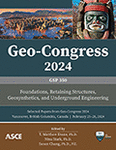Effect of Feature Selection Technique on the Pile Capacity Predicted Using Machine Learning
Publication: Geo-Congress 2024
ABSTRACT
Pile capacity is an important issue in geotechnical engineering, with substantial practical implications. The practice currently relies on a few traditional mechanics-based design methods; however, with the recent advancement in machine learning (ML), many studies started investigating its diverse applications such as predicting pile capacity. The accuracy of the predicted capacity is associated with the quality of the information used as input features. This emphasizes the significance of the feature selection process. In this study, the effect of seven feature selection techniques on the performance of nine machine learning models are investigated using a dataset of 481 piles. The outcome was then compared to the performance of traditional design methods. It was concluded that using the support vector regression ML model combined with sequential feature selection technique resulted in a better performance in terms of precision and the mean absolute percentage error over available methods.
Get full access to this article
View all available purchase options and get full access to this chapter.
REFERENCES
Bowles, J. E. (1988). Foundation analysis and design. McGraw-Hill, New York.
Davisson, M. T. (1972). “High Capacity Piles.” Proceedings of Soil Mechanics Lecture Series on Innovations in Foundation Construction, ASCE Illinois Section, Chicago, 81–112.
Dennis, N. D., and Olson, R. E. (1983). “Axial Capacity of Steel Pipe Piles in Clay.” Proceedings of the Conference on Geotechnical Practice on Offshore Engineering, Austin, TX, USA, 27–29 April; ASCE: Reston, VA, USA; pp. 370–388.
Dennis, N. D., and Olson, R. E. (1983). “Axial Capacity of Steel Pipe Piles in Sand.” In Proceedings of the Conference on Geotechnical Practice on Offshore Engineering, Austin, TX, USA, 27–29 April; ASCE: Reston, VA, USA; pp. 389–402.
Kodsy, A., Ozturk, B., and Iskander, M. G. (2023). “Forecasting of Pile Plugging Using Machine Learning,” Acta Geotechnica. https://doi.org/10.1007/s11440-023-01797-5.
Li, L., and Iskander, M. (2022). “Use of machine learning for classification of sand particles,” Acta Geotechnica, Vol. 17, 4739–4759. https://doi.org/10.1007/s11440-021-01443-y.
Machairas, N., Highley, G. A., and Iskander, M. G. (2018). “Evaluation of FHWA Pile Design Method Against the FHWA Deep Foundation Load Test Database Version 2.0.” Transportation Research Record, 2672, no. 52: 268–277.
Naval Facilities Engineering Command. (1986). Design Manual 7.01 (DM-7.01) Soil Mechanics; NAVFAC: Alexandria, VA, USA.
Olson, R., and Iskander, M. (2014). “Axial Load Capacity of Pipe Piles in Sands.” Soil Behavior Fundamentals to Innovations in Geotechnical Engineering, GSP No. 233, pp. 209–220, ASCE Press: Reston, VA. https://doi.org/10.1061/9780784413265.
Ozturk, B., Kodsy, A., and Iskander, M. (2023). “Forecasting the Capacity of Open-Ended Pipe Piles Using Machine Learning,” Infrastructures, Vol. 8(12). https://doi.org/10.3390/infrastructures8010012.
Peck, R. B., Hanson, W. E., and Thornburn, T. H. (1974). Foundation Engineering, 2nd ed. John Wiley and Sons: New York, NY, USA.
Pedregosa, F., Varoquaux, G., Gramfort, A., Michel, V., Thirion, B., Grisel, O., and Duchesnay, É. (2011). “Scikit-learn: Machine Learning in Python.” Journal of Machine Learning Research, 12(85), 2825–2830. Opgehaal van http://jmlr.org/papers/v12/pedregosa11a.html.
Rizk, A., Kodsy, A., Machairas, N., and Iskander, M. (2022). “Efficacy of Design Methods for Predicting the Capacity of Large Diameter Open-Ended Piles” ASCE Geotechnical & Geoenvironmental Engineering Journal, https://doi.org/10.1061/(ASCE)GT.1943-5606.0002824.
Roling, M. J., Sritharan, S., and Suleiman, M. T. (2011). “Development of LRFD Procedures for Bridge Piles in Iowa Volume I: An Electronic Database for Pile Load Tests (PILOT).” https://intrans.iastate.edu/app/uploads/2018/03/tr-573_lrfd_vol_1_w_cvr.pdf.
Wang, S. T., Arrellaga, J. A., and Vasquez, L. (2019). APILE v2019 – Technical Manual: A Program for the Study of Driven Piles under Axial Loads. ENSOFT.
Information & Authors
Information
Published In
History
Published online: Feb 22, 2024
Authors
Metrics & Citations
Metrics
Citations
Download citation
If you have the appropriate software installed, you can download article citation data to the citation manager of your choice. Simply select your manager software from the list below and click Download.
